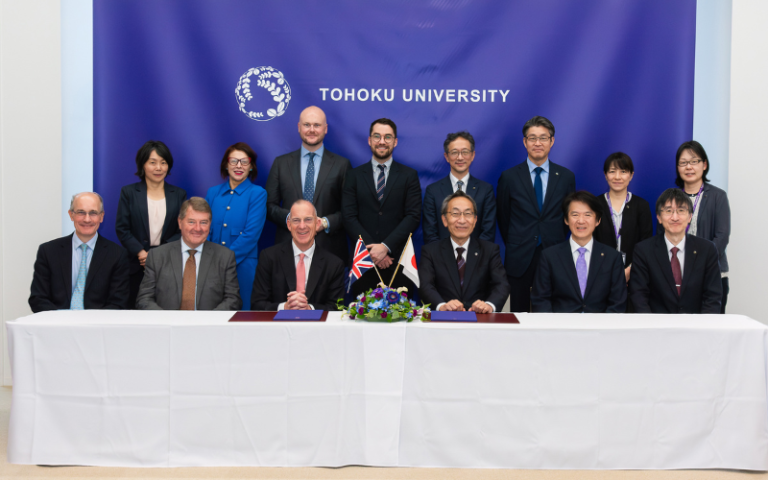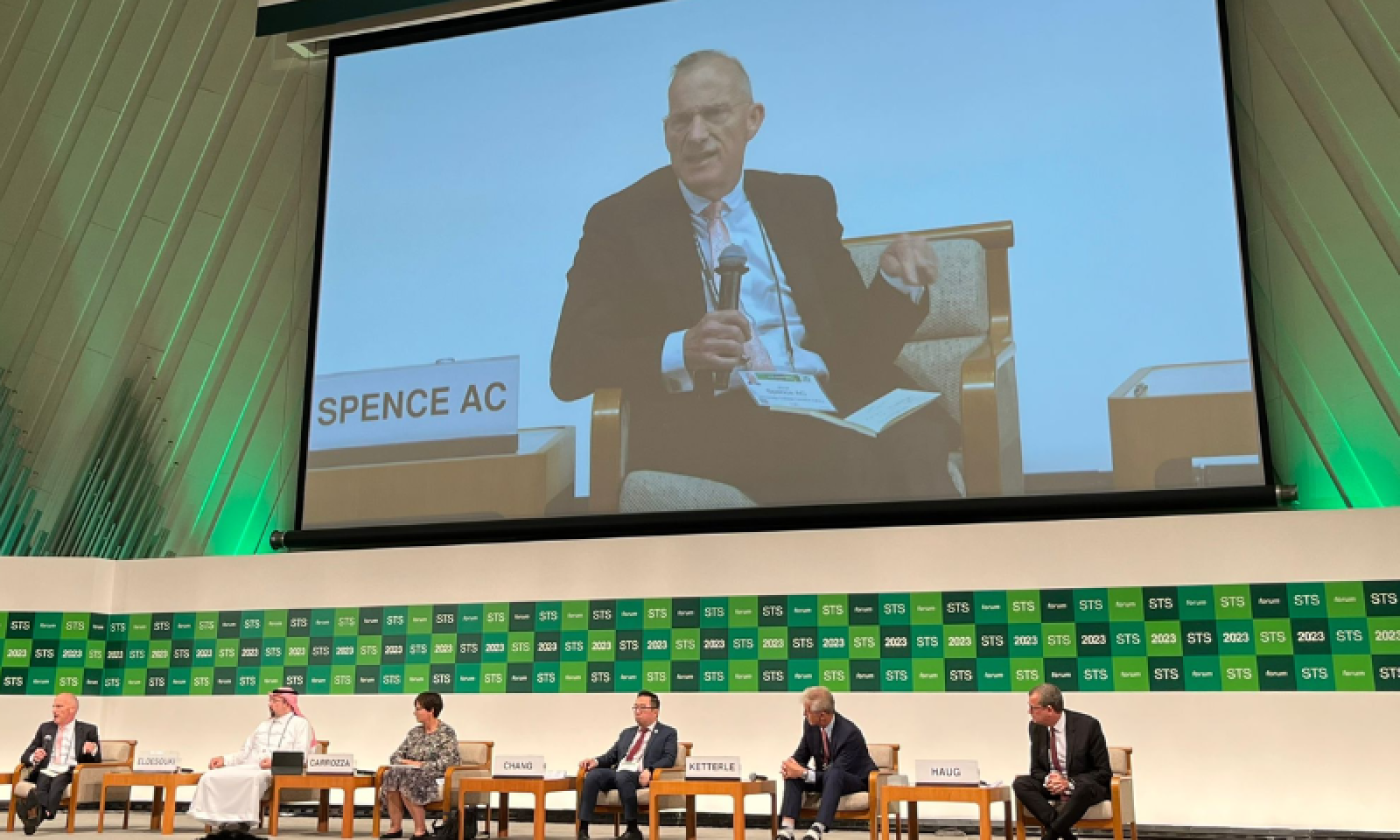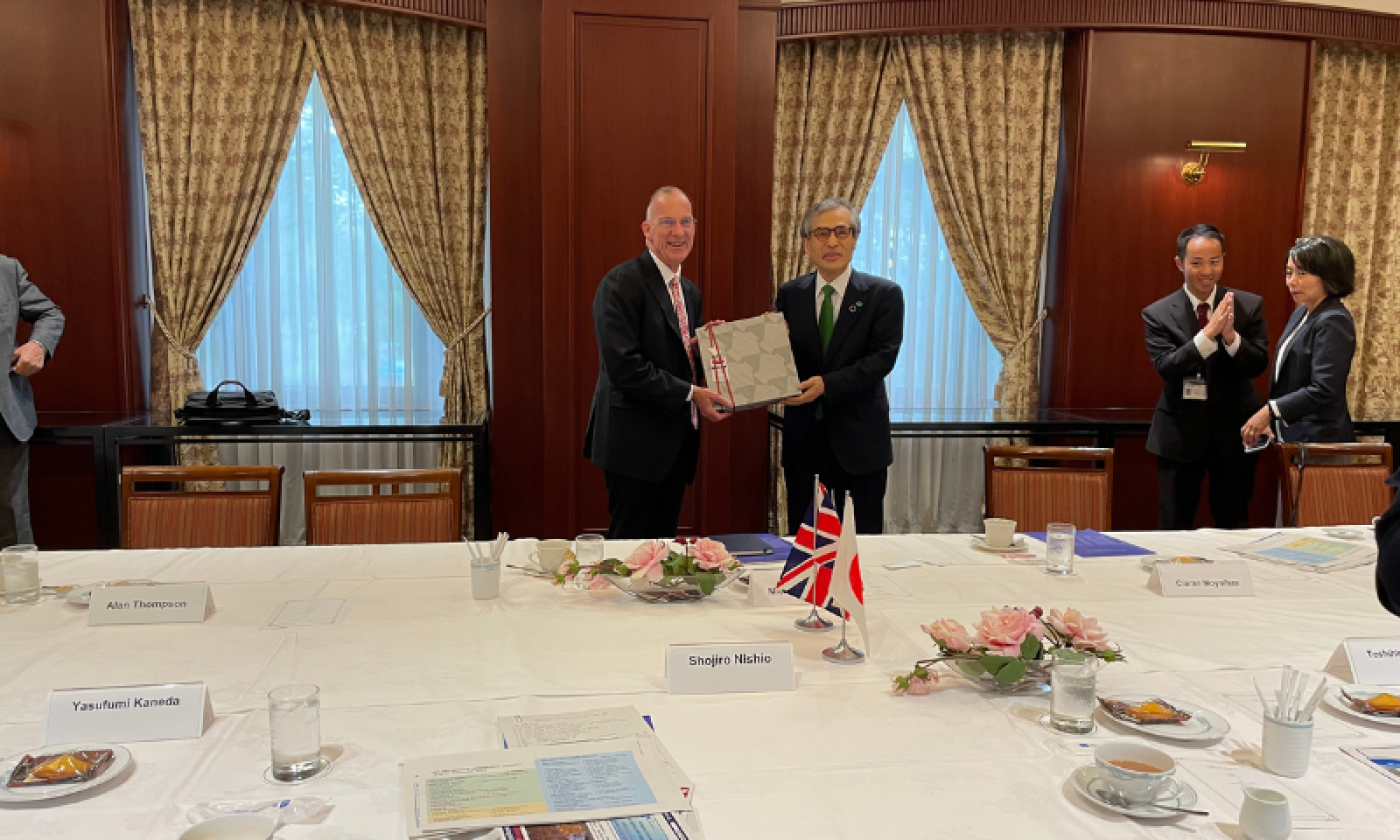Celebrating 160 years of UCL-Japan friendship
2 November 2023
A UCL delegation, led by President & Provost Dr Michael Spence AC, visited the university’s longstanding partners in Japan as part of an institutional visit to deepen UCL’s links.

Senior UCL academics met with key partners in Japan with whom the university collaborates to address a range of global challenges, from dementia to climate change, including Osaka University, Tohoku University, HORIBA and Eisai.
UCL's partnerships in Japan are rooted in a long history dating back 160 years to 1863 when the Chōshū Five, the first Japanese students to study in the UK, arrived at the university. Since then, UCL has developed a strong and enduring relationship with Japan, which continues to thrive today.
In his first visit to the country as UCL President & Provost, Dr Spence was accompanied by a delegation that included Professor Alan Thompson (Dean, UCL Faculty of Brain Sciences), Professor Nigel Titchener-Hooker (Dean, UCL Engineering), and colleagues in UCL Global Engagement, External Engagement and Advancement.
Dr Spence said: “UCL's longstanding partnerships with Japanese businesses and universities are at the forefront of innovation, creating real-world impact in areas such as disaster science, neuroscience and climate change. It was wonderful to meet our partners and community in person and to reaffirm our mutual commitment to tackling global challenges and to scaling up our joint collaborations.”

UCL President & Provost Dr Michael Spence AC participating in a panel discussion on 'Basic Science, Research, and Innovation' at the STS Forum in Kyoto.

Dr Michael Spence (UCL President & Provost) and Shojiro Nishio (President of Osaka University) exchanging gifts. Image credit: Osaka University

UCL delegates visited The Center for Information and Neural Networks (CiNet) at Osaka University. Image credit: Osaka University

UCL delegates alongside University of Tokyo senior leadership at the University of Tokyo. Image credit: University of Tokyo

UCL President & Provost Dr Michael Spence AC and Tohoku University's President Hideo Ohno with the newly renewed MoU. Image credit: Tohoku University

UCL delegates at the presidential meeting at Tohoku University. Image credit: Tohoku University

Delegates from UCL and Tohoku University visit NanoTerasu, a synchrotron radiation facility located on Aobayama Campus, Tohoku University. Image credit: Tohoku University
Strengthening academic ties
Today, UCL produces more collaborative research papers with Japan than any other UK university. UCL academics have co-publications with around 150 Japanese universities and currently produce around 800-900 research papers with Japanese institutions annually.
During the trip, the delegation visited two of UCL's key academic partner institutions: Osaka University and Tohoku University. Both institutions collaborate closely with UCL on successful joint funding schemes, having funded 53 projects to date.
For several years, UCL has closely collaborated with Osaka University in fields spanning dementia, global health, urban sustainable design and urban mobility. This visit offered Dr Spence a valuable opportunity to meet with senior leaders at Osaka University and restate our shared commitment to addressing the world's most pressing problems, particularly by expanding activities in the field of neuroscience.
Dr Spence delivered a lecture to more than 200 Osaka University students and early career researchers, discussing 'Disruptive Thinking at UCL' and how this concept has evolved, shaping our current research and innovation.
At Tohoku University, our institutional Memorandum of Understanding (MoU) was renewed, marking our productive partnership to date and continued dedication to working together in areas such as disaster science, brain science, climate change, AI and education. Members of the delegation also had the opportunity to tour various sites including the Tohoku Medical Megabank Organization (ToMMo), the International Research Institute of Disaster Science, and NanoTerasu, the next-generation synchrotron radiation facility.
They also travelled to the University of Tokyo, where delegates met with senior leadership to explore opportunities for strengthening our research and educational collaborations.
Bridging the gap between academia and industry
UCL has a wide range of industry partnerships in Japan across health and engineering. The visit provided an opportunity to meet with key industry partners, including HORIBA, a global leader in precision instruments for measurements and analysis, particularly in vehicle propulsion technologies. UCL and HORIBA collaborate on decarbonising the transport sector, with the company funding the HORIBA Chair in Advanced Propulsion Technologies and two PhD students to sit within the new UCL Advanced Propulsion Lab (APL) at UCL East, which officially opened in September 2023. The APL focuses on developing battery and fuel technologies for zero-emission transport.
Members of the delegation also met with valued partner, Eisai. For more than a decade, UCL scientists and the global research-based pharmaceutical company have collaborated on a research programme aimed at developing solutions for patients with neurodegenerative conditions. This collaboration serves as a prime example of the importance of partnerships between universities and industry, in translating basic science concepts into mainstream research and development projects.
Building networks
Dr Spence took part in a panel discussion on 'Basic Science, Research, and Innovation' at the STS Forum in Kyoto, which brings together global leaders from academia, industry, and government to discuss critical science and technology issues that will shape the future of humanity.
During the event, Dr Spence met with various leaders, including representatives from the Japan External Trade Organization (JETRO), the British Ambassador to Japan, and the Japan Society for Promotion of Science, with the aim of building networks to tackle some of today's most urgent global challenges.
Later in the week, members of the delegation also met with officials from the Ministry of Education, Culture, Sports, Science and Technology (MEXT) to discuss our commitment to deepening our ongoing and impactful current research and education collaborations with Japan.
To celebrate 160 years of UCL and Japan ties, the delegation enjoyed a dinner in Tokyo with valued friends and partners and longstanding volunteers from the UCL Japan Club. The Club, which was founded in 1992, brings together more than 2,700 UCL alumni living in Japan.
Links
- UCL in East Asia
- Zero-emission transport a step closer thanks to new UCL-HORIBA partnership at UCL East
- UCL and Eisai partnership
- UCL visits Tohoku University for a presidential meeting and to renew their Memorandum of Understanding (article on Tohoku University website)
- UCL President & Provost Dr Michael Spence AC Delivers Special Lecture at Osaka University (article on Osaka University website)
- The Chōshū Five: makers of modern Japan (article in Portico: UCL’s magazine for alumni and supporters)
Featured image
- Delegates from UCL and Tohoku University at the Memorandum of Understanding (MoU) signing ceremony.
- Credit: Tohoku University
 Close
Close

